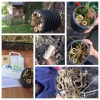Feral Cats
Feral cats were once domestic cats, or the descendants of domestic cats who are now feral. These feral cats often form colonies wherever there is shelter and a ready food supply e.g. farms, industrial estates, hospitals, abandoned buildings, rubbish tips etc. Urban feral cats can usually be seen congregating near dustbins, markets, or anywhere that there is a ready source of food. Where there is one feral cat there are sure to be others.
Damage caused by Feral Cats
Feral cats can create a terrible mess around rubbish bins, scrap lawn surfaces, kill plants, defecate, and create a terrible noise at night especially at breeding time which is constant with feral cats. If they take up residence under a house, deck, or shed they can cause a seriously bad smell.
Feral colonies can act as reservoirs of disease which can be transmitted to domestic cats as well as humans. The probability of them carrying and transmitting several diseases to humans and other cats is high. Diseases include; Toxoplasmosis (Toxoplasma gondii), Tapeworn infection (Pipylidium coninum), Salmonellosis (Salmonella spp), Camplylobacterioses (Campulobacter spp), Cat scratch fever (Bartonella henelae), Round worm (T cati), Yersiniosis (Yersinia enterocolitica). In fact cats are the most important species in the life cycle of the parasite Toxoplasmosis and if feral cats are tested a high percentage of them will test positive to Toxoplasmosis. The feral cat then is a carrier of the disease to humans; the disease often greatly reduces general well-being in humans with the effects being particularly severe to pregnant women. Toxoplasmosis is passed to humans who come into contact with infected cat faeces. If left uncontrolled feral cat numbers can increase to such a degree that they the whole colony can become unhealthy through continual breeding, interbreeding, poor nutrition, and habitual fighting. Being continually pregnant also takes a high toll on the female cat, and often leads to potentially fatal diseases. Kittens are often abandoned to fend for themselves, eventually dying if food becomes scarce.
Status
Feral cats are not a protected species in Ireland and may be controlled in order to or to prevent a health and safety hazard.
They are usually very agressive if cornered. So, in order to protect both yourself and the cat any necessary management should be done by experienced control specialists. Wildlife Management Services have been providing solutions for feral cat problems for the last 12 years and are experts in the field.
Please contact us at 087 6410206, 057 8623042 with your feral cat problem.



